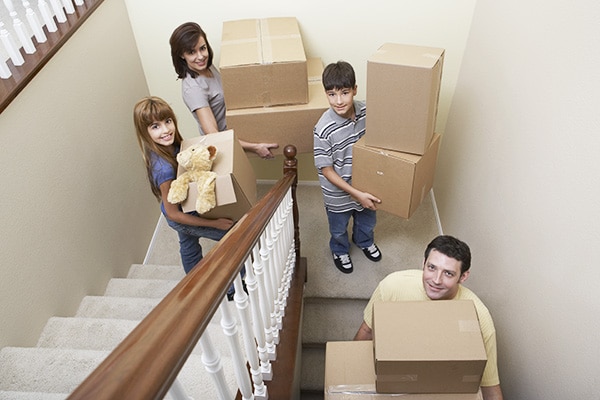
Moving allows you to go on a new adventure. It is particularly exciting if you’re moving into your very first home as a homeowner. However, as exciting as moving can be, it is also stressful.
There are many different factors to consider when moving—from finding a new home, to organizing a moving service, to taking care of utilities, and more.
One duty you won’t want to neglect is transitioning out of your current rental. Many people get so excited about moving into a new home or apartment that they forget that they also have responsibilities at their existing home.
Neglecting the duties on your current lease could be a costly mistake. Chances are, you placed a security deposit whenever you moved in. If you don’t take all of the proper steps when moving out, your landlord could decide to withhold your deposit. And, if your landlord isn’t happy with the current condition of the house, they may end up charging you additional fees.
If you’re in the process of moving out of your rental, make sure that you’ve done all of the following steps. Following these steps can increase your chances of getting your security deposit back.
Look over the lease agreement
The first thing you’ll want to do is look over your lease agreement. This will let you know what your responsibilities are during the moving out process.
Most landlords will require you to give a 30 days notice. This gives them enough notice so that they can start lining up a new tenant. Not giving a full 30 days notice means you could owe another month’s rent.
They may also require end of tenancy cleaning. End of tenancy cleaning goes beyond a normal cleaning—it requires a deep cleaning of the entire space.
Finally, you may also be required to fix any damage that occurred. If your kiddo spilled grape juice on the carpet and stained it, it is your responsibility to get rid of the stain. If your cat broke the blinds, you’ll need to buy new ones. Not all landlords have this clause, so review the lease carefully.
Talk to your landlord
Give proper notice to your landlord. While it is okay to verbally talk to your landlord about your decision, you’re going to want to pair it with a written letter or email. Most notices aren’t considered final until a written form of communication is provided.
Don’t give notice over text. Not every state recognizes text messages as a form of written notice, which could put you in an unfortunate position later.
Make sure that your landlord acknowledges that they received your written notice. If they deny receiving it, have another written notice ready to go and deliver it in person. Also, make sure that it has a date on it.
When talking to your landlord, clarify any questions about the lease. If the lease specifies that the rental needs to be left in the same condition, but doesn’t specify cleaning, ask what level of cleaning you’re expected to provide.
Clean and repair the property
Many landlords require you to leave the property in the same condition as it was when you moved it. They may also require an end of tenancy cleaning.
Walk around the interior and exterior of your property to check for damage. Make note of any damage, even if it seems minor. If the damage goes beyond normal deterioration, you’ll want to find a way to fix it.
Most landlords cover the costs of any normal deterioration that comes with living in a house (for example, slightly chipped paint). You’re responsible for anything that goes beyond that (such as scribbled on paint).
Once repairs are made, do a deep cleaning of the property. This will go beyond dusting and vacuuming. You’ll need to clean appliances, wipe down baseboards, make sure there isn’t any mold growing in the shower, and more. If you’re in a pinch for time, consider hiring a professional cleaning company to help.
Take care of utilities
You’re going to be responsible for paying any utilities that you used in your final months at your rental, even if the bill will come after you’ve moved out. Try to find a way to pay off the water and electric bills before you move out.
Plus, don’t forget to think about your cable and internet bills. These bills will likely transition with you to your new home.
Reach out to your providers to see what steps you need to take. If your new house isn’t yet wired for cable and internet, you may have to pay another installation fee. The provider may also require you to turn in your existing equipment and rent new equipment instead.
Keep in mind that you may also end up having to pay towards utilities at your new house in addition to what you owe from your rental.
Get your items out
Try to get all of your items out several days before your notice is up. This can be tricky if you’re not able to immediately move items into your new house. However, sometimes it is beneficial to move items into a moving truck or storage unit even before your existing lease is up.
Moving all your items out allows you to make sure everything in the rental is repaired and cleaned. It can be frustrating to vacuum a room, move the couch, and then realize there was a bunch of dust under the couch.
Moving items out early also gives you several chances to make sure that you really got all of your items out. If you have items tucked away in the attic and basement, double-check those spaces to make sure nothing is hidden in a dark corner.
Getting out items early can be stressful, but also helpful so that you’re not scrambling around at the last minute.
Do a final inspection
Once you think you have everything removed from the property, do a final inspection before turning your keys in. Ideally, you’ll have everything moved out and cleaned up in advance of when you officially need to be out.
This allows you to come back on another day with a fresh mindset to do the final inspection. A fresh perspective can allow you to catch things you might not have seen before, such as a broken lightbulb or a dirty stove.
If you spot anything that needs to be cleaned or repaired during your inspection, take care of it immediately. Don’t wait until your landlord to discover it!
Also, don’t forget to triple-check that you have all of your items out. You don’t want to turn your keys in and then realize you left your favorite book on the back of the toilet. Chances are, your landlord will throw any remaining items away.
Document the condition of the property
Depending on your relationship with your landlord, you might want to take photos of the property before you leave.
Document that you left it in a clean condition with no damage. If there is any deterioration damage, make sure to document that as well. Take photos of every room and of the exterior of the property. Make sure to include close-ups of anything you’re questioning or that you repaired.
If your landlord comes back and tries to say that you didn’t leave the property in good condition, you’ll have the photos as proof that you did leave it in acceptable condition.
If you have a cleaning company or construction company come to the rental, make sure to document that as well with an invoice. If your landlord tries to say the rental wasn’t cleaned properly, the invoice provides proof that you hired a professional.
Complete a walk-through with the landlord
Once you have everything moved out, cleaned, and documented, it is time to turn in your keys! Try to schedule a time for your landlord to come to the rental.
Ask them to do a walk-through with you. Ask them if they spot any damage or anything that isn’t meeting their cleaning standards.
Most of the time, if they spot something they dislike, they’ll mention it during the walk-through and will give you a chance to fix it. This also gives you time to dispute any of their concerns. For example, if they try to claim there is water damage from when you lived there, but the stain was actually there when you moved in, the two of you can come to an agreement before you officially move out.
Some landlords will do this, while others won’t do a walk-through until you’re officially moved out. If they refuse to do a walk-through with you, don’t forget to document the condition that you left the house in!
Final thoughts
If you complete everything on this list and leave your rental in excellent condition, you should get your security deposit back. Your landlord should give you a check shortly after you move out. You should do everything that you can to get your deposit back. You will probably need this money to help cover moving expenses.











Author
Homesgofast com
Homesgofast.com is an international real estate portal and news source for Google news. Publishing international real estate, finance, homes and travel-related news and blogs for a targeted audience since 2002. Each news item is circulated to thousands of potential readers each day and is also available to the millions of people who sign up for Google news alerts. Find homes offered for sale and to rent direct from owners and some of the best real estate agents from over 35 countries